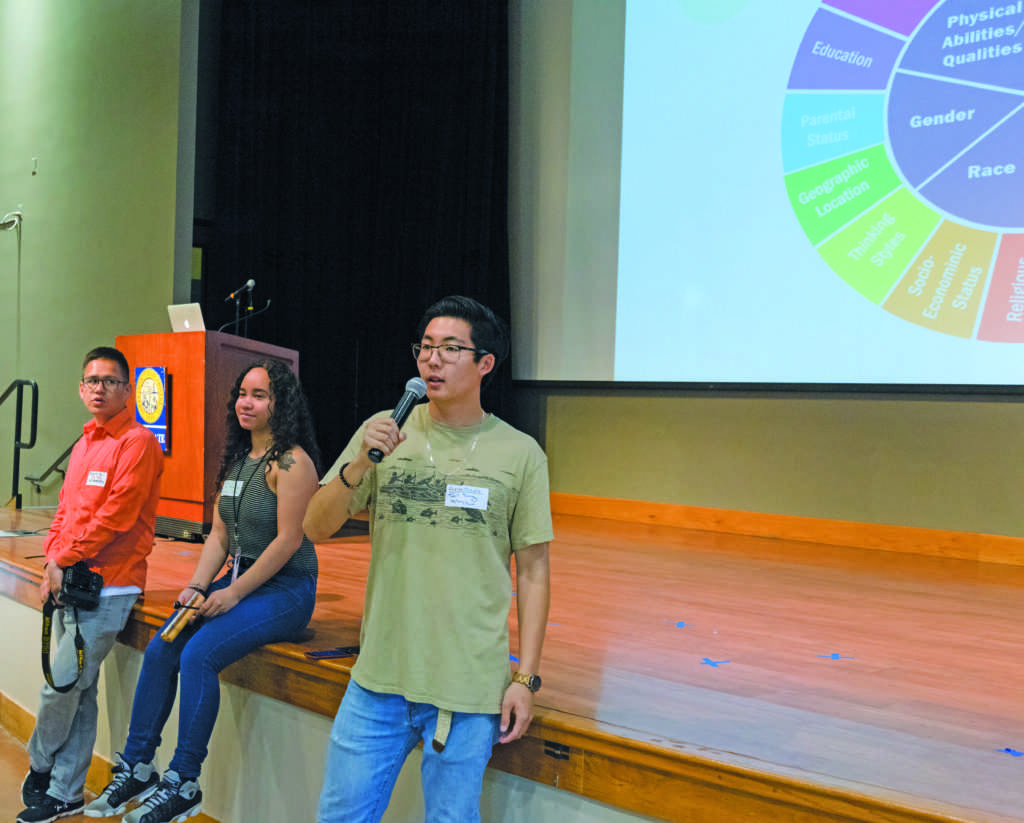SF State psychology major Taeil Sung (right) speaks to the crowd as psychology major Coco Griffin (left) listens at the Active Minds 2nd annual Mental Health Symposium in Jack Adams Hall on Friday, May 3, 2019. (CHRIS ROBLEDO/Golden Gate Xpress)
The second annual Active Minds symposium focused on providing mental health help and coping mechanisms to students of color.
The symposium titled, “Staying Grounded with Self-Care for Students of Color,” took place in Jack Adams Hall on Friday from 10 a.m. to 2 p.m. The conference was sponsored by Associated Students, Inc. and Active Minds, a student-led organization that focuses on changing the taboo narrative of mental health.
During the four hour event, more than 20 SF State students participated in workshops, including art and writing activities, revolving around self-care and identity. Active Minds encouraged students to reflect on their identity and analyze how it affects their ability to access and use mental health assistance.
To begin the conversation, Active Minds member Koko Griffin asked participants to pick an important part of their identity such as race, gender, sexual orientation or ethnicity and examine how this characteristic might affect their social identity and mental health.
Griffin shared her own personal struggles with racial identity as a mixed child.
“I’m Samoan and Black and whenever I go with Samoan family, they reject me because I don’t speak the language as much,” Griffin said. “Whenever I try to bond with my Black family, they judge me because I have a lighter skin tone than most of them.”
Griffin said that this rejection from her family makes her feel displaced and constantly makes her question her racial identity, causing a mental struggle.
According to the American Psychiatric Association, people who identify as being more than one race are more likely to report a mental illness.
Another topic of discussion was how families of color do not discuss mental health openly. Active Minds member Taeil Sung shared that, as an Asian American man, mental health was a topic not discussed in his household growing up.
“It wasn’t until college where I really came to learn about how to take care of myself,” Sung said.
Matthew Peralta, president of Active Minds, agreed.
“Sometimes, when I’m talking to my mom, I always tell her that I’m doing better than I actually am,” Peralta said. “I don’t want to disappoint her.”
Peralta conducted a workshop at the symposium where he spoke about intersectionality, first-generation students and coping mechanisms. Peralta described intersectionality as overlapping social identities that are often used by systems of power to oppress the individual.
Peralta acknowledged the academic and familial pressures first-generation students face.
Peralta encouraged participants to examine their mental state every once in a while and to engage in activities that bring peace.
“Self-care is a process, and [you] can’t be good all the time,” Peralta said. “Allow yourself to be vulnerable. Open the vent and let it flow.”
The Active Minds team encouraged participants to engage in art as a form of healing.
Attendant SF State student Sonia Chen, 22, said she practices self-care through yoga, meditation and self-pep talks.
“It’s important to take care of yourself first,” Chen said. “Life is a process, you don’t have to be so hard on yourself.”










